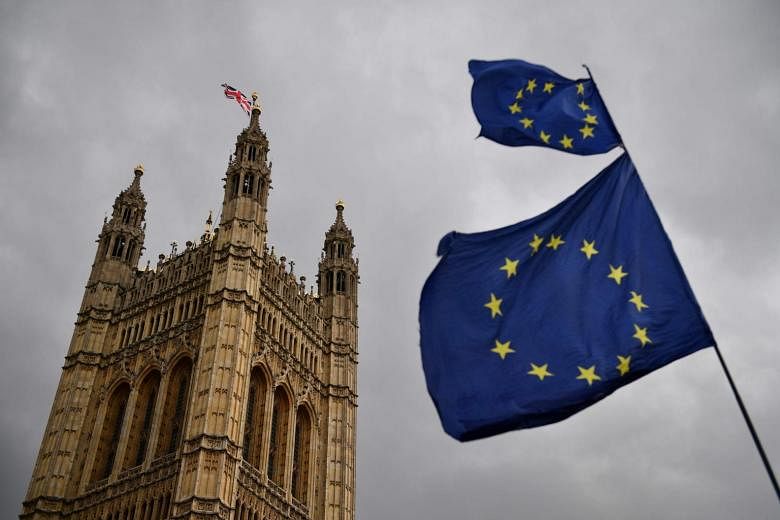BRUSSELS (AFP) - The agreement by European Union leaders to grant Britain another extension to ratify its exit from the EU sets several conditions, including those designed to protect the bloc from British interference.
The deal struck in the early hours on Thursday (April 11) allows Britain until Oct 31 to ratify the divorce it had set for March 29, but it leaves the door open for Brexit to still take place anytime before then.
The agreement between British Prime Minister Theresa May and her 27 EU counterparts went beyond an original two-week extension set for Friday (April 12), when Britain risked crashing out of the bloc and creating economic havoc.
Following are the key conditions contained in the conclusions of the eight-hour summit in Brussels.
NOT 'UNDERMINE' EU
In answer to Mrs May's April 5 letter for a new delay, her 27 counterparts gave her until Oct 31 to persuade a divided British parliament to ratify the withdrawal agreement she struck in Brussels last November.
"If the Withdrawal Agreement is ratified by both parties before this date, the withdrawal will take place on the first day of the following month," the conclusions said.
The leaders stressed that "the extension cannot be allowed to undermine the regular functioning of the Union and its institutions".
EU countries are trying to make sure that Britain does not interfere in upcoming decisions on a new multi-year budget, trade policies or a new president of the European Commission, the bloc's executive arm.
Hard-line Brexiteers in the UK had warned they could disrupt EU functions.
EUROPEAN PARLIAMENT ELECTIONS
If Britain has not ratified the divorce by May 22, it must hold the elections to the European Parliament from May 23-May 26.
If London fails to meet such a EU legal requirement, it will crash out of the bloc on June 1 without an agreement.
NO RENEGOTIATIONS
The EU leaders reiterated the withdrawal agreement reached last November cannot be reopened.
Many members of Mrs May's ruling Conservative Party oppose a clause in the divorce deal that they say could keep British Northern Ireland indefinitely in the bloc's customs union.
FUTURE TIES
The leaders stressed that the EU and Britain must not use the extension to start negotiations on a post-Brexit relationship, including on trade.
However, if Britain develops new ideas on future ties, they would be "prepared to reconsider the political declaration on the future relationship", a roadmap that was also agreed in Brussels last November.
New discussions would have to be in line with EU negotiating guidelines, which include a guarantee to maintain an open Irish border.
'SINCERE COOPERATION'
The leaders took note of London's pledge to act constructively and responsibly during the extension in line with "the duty of sincere cooperation" as a withdrawing member.
Britain therefore must "facilitate the achievement of the Union's tasks and refrain from any measure which could jeopardise the attainment of the Union's objectives". It highlighted again that London must not sabotage the bloc's decision-making processes.
SEPARATE MEETINGS
Apart from meetings involving Britain and the other EU members to discuss Brexit, London will be excluded from talks involving any post-Brexit EU business.
European leaders will review progress at its regularly scheduled summit in June.











